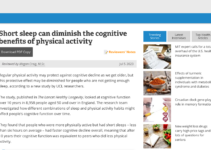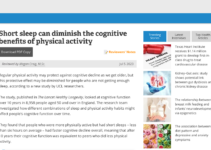The Importance of Sleep and Coping Strategies in Maintaining Mental Health
Sleep is a fundamental biological process that plays a crucial role in maintaining overall health and well-being. It is during sleep that our bodies and minds rejuvenate and repair themselves, allowing us to function optimally during waking hours. However, the quality and duration of sleep can be greatly affected by various factors, including stress and negative experiences.
A recent study published in the journal Cortex has shed light on the importance of high-quality sleep and positive coping strategies in preventing poor mental health outcomes when faced with negative or stressful experiences. The study aimed to test the theory that coping strategies, when combined with good sleep, can support positive mental health outcomes.
The findings of the study revealed that both high-quality sleep and positive coping strategies are crucial for maintaining good mental health, especially during periods of chronic stress. The researchers emphasized the need to target both aspects when dealing with long-term stress.
Previous studies have primarily focused on the snapshot effect of sleep and physical activity on cognitive function, leading to surprising results. It was found that regular physical activity may not always be sufficient to counteract the long-term effects of sleep deprivation on cognitive health.[0] This highlights the need for a comprehensive approach that includes both sleep quality and physical activity.
The link between sleep and cognitive health in aging adults has also been explored in various studies. Sleep architecture and respiratory-related sleep disturbances have been found to be associated with cognitive function in middle-aged to older adults. Cultural and individual factors have also been found to influence sleep quantity and quality, further emphasizing the importance of personalized approaches to sleep management.
Sleep disorders, such as insomnia, have been the focus of research on the effectiveness of various interventions. Nurse-delivered sleep restriction therapy has been found to be clinically effective, safe, and cost-effective for treating insomnia disorder in primary care settings. Relaxation therapy has also shown promise in improving sleep quality and reducing insomnia symptoms.
Irregular sleep patterns have been found to be associated with increased mortality risk, as well as cardiovascular diseases (CVDs).[1] The American Heart Association has included sleep duration as one of its guidelines for CVD prevention.[2] Sleep irregularity disrupts circadian rhythms, which can lead to chronic age-related diseases.[2] However, more scientific evidence is needed to fully understand the adverse health impacts of irregular sleeping and waking patterns.
In order to better understand the relationship between sleep, mental well-being, and other factors, researchers have collected data on participants' sleep, mental well-being, alcohol consumption, quarantine status, and physical activity levels.[3] This comprehensive approach allows for a more holistic understanding of the factors that influence sleep and mental health.
The COVID-19 pandemic has provided a unique context for studying the effects of stress on sleep and coping strategies. The prolonged period of stress experienced by people worldwide has highlighted the need to address the impact of stress on sleep quality and mental well-being.[3]
Overall, the research suggests that high-quality sleep and positive coping strategies are essential for maintaining good mental health. The findings emphasize the need for a multidimensional approach that takes into account individual factors and provides personalized interventions. By prioritizing sleep and implementing effective coping strategies, individuals can mitigate the negative effects of stress and improve their overall well-being.[3]
0. “How do I stop my mind racing and get some sleep?” theconversation.com, 25 Aug. 2023, https://theconversation.com/how-do-i-stop-my-mind-racing-and-get-some-sleep-207904
1. “Sleep Disorder Information, Research & News Center | Sleep Apnea …” www.clinicaladvisor.com, 25 Aug. 2023, https://www.clinicaladvisor.com/home/topics/sleep-information-center/
2. “Are irregular sleep patterns associated with increased mortality risk?” www.news-medical.net, 25 Aug. 2023, https://www.news-medical.net/news/20230822/Are-irregular-sleep-patterns-associated-with-increased-mortality-risk.aspx
3. “Got the blues? Study says you should get a good night's sleep …” www.news-daily.com, 25 Aug. 2023, https://www.news-daily.com/local/health/got-the-blues-study-says-you-should-get-a-good-night-s-sleep/article_61ff2cdb-3733-534d-a398-a5c8dce362e0.html





